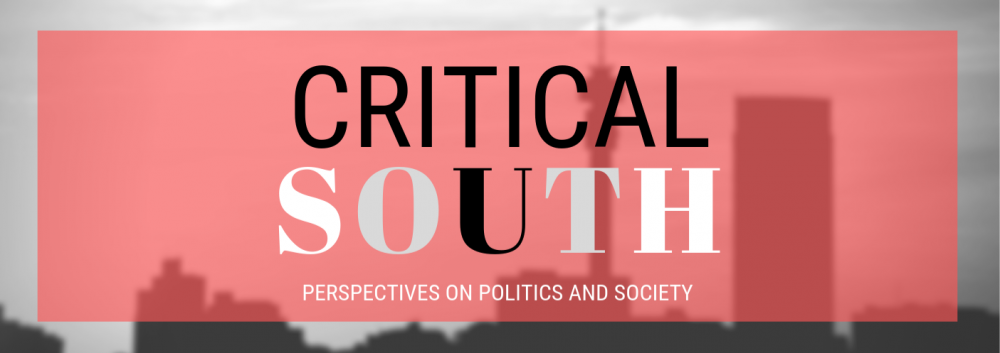
Bright Nkrumah is a Postdoctoral Researcher whose research interests include populism, constitutionalism, socioeconomic rights, peace and security, good governance, resistance, freedom and democratization.
Why we need to address the challenges that come with an upsurge of populism in the Global South
Dick the Butcher is one of the lesser known characters in the second part of Shakespeare’s trilogy about Henry VI. As a member of the gang of Jack Cade, who is a pretender to the throne, Dick often makes amusing and highly comedic statements. As a Grade 5 pupil, he lobbies his mates for class prefect position, promising shorter class days and delicious lunches. Cade (in the comic relief part of the play) makes vain boasts about how he’d provide free food and drinks for everyone, how drinking light beer would be a crime and a penny would buy seven half-penny loaves. Dick’s ultimate sell is: ‘The first thing we do, let’s kill all the lawyers’. To this henchman, this is the best way to address societal problems and improve the country.
This claim of the mutually intrinsic linkage between lawyers and lawlessness is significant in the context of populist movements. To some they are seen as a threat to democracy and the primary source of social disintegration (Canovan 1999; Canovan 2004). Thus, in light of this negative connotation, should the Global South heed the advice of Dick and ‘kill’ all populists with moral condemnation and demonization? No!
To reverse the populist evolution, it is vital to adopt an analytical viewpoint and cast aside the simplistic account of the media that presents populism as simply irrationality, utopian thinking or mob rule.
Populism can simply be defined as a means of constructing a political frontier by dividing society into two antagonistic groups: the ‘people’ against corrupt ‘elite’. To be exact, it is the rhetoric of ‘us’ versus ‘them’. Given that the composition of both groups is not clearly delineated, it is vital to distinguish between the different kinds of populism.
The rise of populist movements in the Global South should be seen against the backdrop of contemporary liberal-democratic politics. This was triggered by the compromise reached between the parties of the centre-left and centre-right on the notion that neoliberal globalization has no other substitute. By complying with the demands of international financial institutions such as the IMF’s structural adjustment programmes, key democratic concepts such as parliamentary sovereignty and popular sovereignty, which allows people to influence public policy, have not only been drastically watered down but abandoned. In recent years, any reference to ‘democracy’ in the Global South merely refers to the protection of human rights and conduct of elections. These developments (marked by a form of regulation of Capitalism) has resulted in massive poverty and glaring inequality. It is, thus, not far-fetched to say the Global South has been plunged into a state of oligarchisation.
Since political and social crisis can be seen as fertile ground for populist appeal, several populist movements have sprouted claiming to represent the interest of the people being ignored by the elites. Notwithstanding some of the strategies these movements adopt, it is vital to acknowledge some of the legitimate democratic ideals some aspire to restore. In South Africa, the belligerent character and combative tone of populist party, the Economic Freedom Fighters (EFF) has somewhat eliminated concerns that dominant party syndrome (of the ruling African National Congress) will undermine the constitutional mandate and diminish the independence of strategic institutions such as the National Assembly. It is the lack of a narrative capable of providing a distinct terminology to construct the struggles against our contemporary society that shows that populism resonates in several sectors of our political and social order.
To this end, populism should be conceptualized in a progressive way. It should be seen as a force that enhances and consolidates the neoliberal project rather than one that simply dismisses the issues they have put on the agenda. One would agree that the growing number of supporters for movements such as the Black Management Forum (BMF), the Black First Land First (BLF), the Decolonisation Foundation and the EFF demonstrate that ‘killing’ the populist through moral chastisement has not been effective in countering right-wing populism, especially as it reinforces the anti-elitist sentiments among the popular classes. What is lacking, and urgently needs to be done, is to address the issues they raise, like poor service delivery and state looting. These need different responses, one which is capable of rallying support towards social justice and equality. The best remedy to oppose existing right-wing populist movements and forestall the emergence of new ones is through the development of a real left-wing populist movement.
When the EFF first emerged in 2014, it was often described as left-wing populist (Buccus 2019). But in hindsight this is obviously incorrect. The party’s populism has demonstrated to be more of the right – a mixture of the authoritarian decrees of its 2019 manifesto banning the private sector from owning land and lavish lifestyle of its ‘firebrand’ leader Julius Malema. The feasible grounds to construct a real-left populist movement will be the new social forces that have sprouted from the shack settlements and trade unions outside the ruling party. Besides deepening democracy, this project’s focus should be the constitution of a collective that creates synergy between the multiplicity of political forces and social movements.
Despite these promises, there is a missing link – there is no visible charismatic leader who could unite these forces and progressively articulate the democratic demands existing in contemporary South Africa, or the countries in the Global South. If this challenge is addressed, there is a prospect for this collective to become hegemonic and have a transversal character, especially since several social sectors have been hammered by financialised capitalism.
Contrary to the anti-populist narrative of political commentators and the media who see populism as an affront to democracy, the most suitable political force to recapture and expand democratic ideals in contemporary South Africa and the Global South is left-wing populism.
- Buccus, I. 2019. ‘Imraan Buccus: What chance does the ‘left’ have in the 2019 elections?’, First Thing
- Canovan, M. 1999. ‘Trust the People! Populism and the Two Faces of Democracy’ Political Studies, 47(1): 2-16.
- Canovan, M. 2004. ‘Populism for political theorists?’ Journal of Political Ideologies, 9 (3): 241-252.
![]() Lawrence Hamilton is the SA UK Bilateral Chair in Political Theory, based at the Universities of theWitwatersrand and Cambridge. He contributes to rethink political theory from and for the Global South. His works include Amartya Sen (2019), Freedom is Power (2014) and The Political Philosophy of Needs (2003).
Lawrence Hamilton is the SA UK Bilateral Chair in Political Theory, based at the Universities of theWitwatersrand and Cambridge. He contributes to rethink political theory from and for the Global South. His works include Amartya Sen (2019), Freedom is Power (2014) and The Political Philosophy of Needs (2003).
